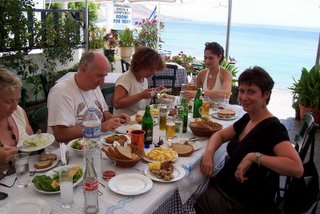Well it was a delicious last day in Austin. We braved temps in the high twenties (while it was snowing in
Victoria??) to get to the conference centre for the last day of AWP panels. I slipped into the book fair for a final decisive purchase:
Robin Skelton's The Shapes of Our Singing which I hadn't realised was even in print. Very succinct and comprehensive - not to mention conveniently alphabetical - listing of forms both common and obscure.
As if I'd invoked him, Skelton's name was mentioned early in the first panel I went to: The Poetic Sequence, when
Madeline de Frees confessed to having taught at one time at
UVic when he was still at the helm, and said he'd told her poetic sequences mean never running out of things to write about. We heard also from
Chase Twichell, attending AWP as both
publisher and writer, reading - too briefly for me - from
Dog Language which I'd picked up earlier at the
Copper Canyon stand(--hey, she owns an Australian Shepherd/Border Collie mix: she must have *some* excess energy!) ;
Matthew Zapruder;
Gregory Orr; and
Erin Belieu, who gave us a hilarious introduction to her ferociously angry sequence,
In the Red Dress I Wear to your Funeral.
The arguments given for the poetic sequence seemed at times to be similar to those for writing novels: lots more room to explore your topic, scope for making giant leaps and conjoining disparate ideas. And an opportunity to scope out some formal challenges: Orr, on the subject of his
Orpheus & Eurydice, talked about using myth as a known narrative against which he could pose lyric moments to illustrate points of crisis in the story - a kind of "between the lines" approach to the subject that touched some sympathetic nerve in me and made me think this might be a good touchstone. Zapruder used a repeating name in a descending position in each of twenty 20-line poems as a response to grief. De Frees quoted
Arthur Koestler who suggested the laws of association are multiple and varied: if two things occur to you at more or less the same time, they are connected, and you as the poet become the connection's vehicle.
Moving right along I went to Blogs, Boards and Online Journals: Salons for the 21st Century. We had some big names in blogging: Ron Hogan (
Beatrice.com, one of the oldest poetry blogs around), Rodney Shankar (
Drunken Boat), Tony Tost (
Unquiet Grave), Joshua Corey (
Cahiers de Corey), and
Poets.org editor Robin Beth Schaer moderating. Lots of ground covered: blogging every day will improve all areas of your writing; aspects of engaging in the dialogue with other bloggers - pro and con; differences between the way online journals, listservs and blogs shape a dialogue (differing in the amount, type and direction of the communication); corporate uptake of blogs ("now HarperCollins has started a poetry blog, is the end in sight?"); the way that online journals have separated poetry publishing from "prestige journals" and offered a forum for publishing writers from around the world who might never have found their way into US print journals. And more and more.
For my interests it was rather too male dominated, which I hadn't realised was bothering me until the chasm was opened by a late question/comment from a woman blogger who said (contrary to earlier discussion about blogs being a primarily male domain and not much participated in by women) that she knew a
lot of women bloggers, and that they were writing to keep in touch with one another's lives rather than to air opinions or theories. That she knows women who've unsubscribed to listservs that get taken over by male argument. That the blogs of women she knows are not single-focused (e.g. purely on writing), but sprawl across the whole of their lives, so might include writing, parenting, work and (yes!) dinner. And that because they are just "my blog" and not "THE (or A) blog, on xyz" they may simply be passing beneath the radar of male bloggers who focus on and read the more specific blogs (as her husband does) and go unremarked in more academic links. It seemed an extension of male/female attitudes to compartmentalisation, agreed one of the panellists. The topic of women's literary (and whatever) blogs seems to be a panel topic in search of a conference.. Meanwhile, there is
WOMPO, a listserv devoted to the discussion of women's poetry.
On I went to Low-Residency MFA Programs and the Pedagogy of Online Classes, which was a panel from the
University of New Orleans. Because they were up on their distance ed methods, and the residency parts of their programs are taught in Spain, Italy and so forth, they suffered less than many of the other faculties when Katrina hit. Yeah, tempting program (though apparently they lose a few students during the
running of the bulls at the Fiesta of San Fermin each year)!
In the online courses, they do online workshopping and the instructors present had conflicting policies on whether to allow or require students to edit their posts, and whether to delete posts or not for example in the case of personal attacks. They found students were typically very careful and sensitive in their comments on their classmates' work, though discussions sometimes got heated.
One of the former students said low-residency programs were a very different experience depending on whether you started with the residency or plunged straight into online, but felt they were a good model for a writing life, because staying on track with the workload imposed a solitary discipline that was helpful down the line. She thought there was less of the sense of loss that residency MFA program grads might experience after a year or two of close contact, as low-res students were already used to staying in touch over distance. Another former student offered some suggestions for building community in online classrooms: add a forum for the kind of idle chitchat that takes place in face to face classes; post pictures of students to personalise the dialogue; include an opportunity for students to introduce themselves; ensure students have some basic html to make posting easier (how to add italics, links etc.); encourage face to face meetings at conferences etc.
One discussion came up about the expectations, on the part of students, that instructors would respond instantly to questions and were sometimes kept waiting too long (e.g. for technical questions); vs. instructors who had let the online workshop take over their lives. One instructor commented that a couple of hours in a face to face workshop seemed a positive luxury over the 20-30 hours per week they were spending teaching online ones. But on the other hand, online gave them the luxury of considering and revising their responses to creative work and to posts.
And then for something completely different I tried Ballads vs Ballads: Poetry and Songwriting. For me the two most interesting discussions were those of
Charlotte Pence, who teaches in Nashville, and songwriter
Tim Jenkins. Pence said that a quarter of her students were music majors so songwriting was central to them, and she studies song lyrics with them as a bridge to a study of literary lyrics. She discussed a theory that compares the structure and rhetorical techniques of country and western song lyrics to Shakespearean sonnets and referred us to an article by
Jill Tedford Jones for more on that topic.
Jenkins told us about the process used in
songwriting workshops, which sounded not unlike poetry workshopping - same but different. They start by determining the structure (rhyme scheme, chorus use/not etc.) and whether the song follows and acknowledges the expectations and history of its structure. They go through the musical/lyrical stress lines, matching the stresses in the music to those in the words (are they natural, appropriate). They look at the "genre goals" - does the song follow the rules of its form (for example, in country and western, you need to introduce all the characters in the first couple of lines). Then the rhetorical situation: who's going to be singing this, you or someone else, because that affects a number of things about it. They look at the use of words as instruments for singers: vowel sounds for emotional impact (e.g. a long "e" held over time tends to make a singer sound strangled). He demonstrated live with his guitar which was a nice change from straight panel discussions. They recommended
Pat Pattison's books, and commented briefly about transporting poems into songs (Jenkins says he loves doing this, but will almost always have to "tweak" a bit - maneuvering rhymes and sometimes restructuring lyrics to make them work with the melody). A comment came up about cliche as a communal sense of emotion in song lyrics: part of an emotional register that works in song rather than poetry, and part of why country and western songs include, or perhaps require, puns and cliche.
The final session was Prosody for the 21st Century. The panel was
Annie Finch,
Timothy Steele,
Marilyn Taylor and
Thomas Cable. Impossible now to summarise but the message - both from the panellists and from the size of the audience (I counted about 100) seemed to be that there's a lot of metrics about, whether deliberate or instinctive, and that we need more than iambic pentameter to fill the gap. There was talk of Derek Attridge's
Rhythms of English Poetry, and his alternative
scansion of beats and off-beats rather than conventional foot scansion, which seems to work better with freer verse forms. The point was made that you can of course scan anything, but what makes something metrical is repetition with pattern.
After a last sweep of the book fair, we headed to
Tesoros for some focused browsing of a whole lot of everything and slipped out when the store closed. For food du jour we went back to
Cuba Libre for Sopa de Poblano - fabulous, with a side of fresh chopped tomato, cilantro, tiny cheese cubes, fried tortilla strips to add - followed by coconut shrimp with a jicama sweet pepper salad (I wouldn't call it slaw as the menu did). Judy had black bean soup with plantain chips and a pair of dense, rich crabcakes. We sprinted back to the Hilton on
mojito moccasins and caught the end of
Timothy O'Brien's lecture and finally what was left of the Academy American Poets Poetry Extravaganza - the end of
Mark Jarman's reading (particularly wanted to hear him if only to rid myself of longstanding confusion seeing his name and thinking of Canada's
Mark Anthony Jarman);
Marilyn Nelson's triolets charmed me, and I found her a dab hand at rhyme in other pieces she read.
And that - other than packing a small but incredibly heavy library of acquisitions into the suitcases - was that.
Labels: Austin, AWP, writing conferences











